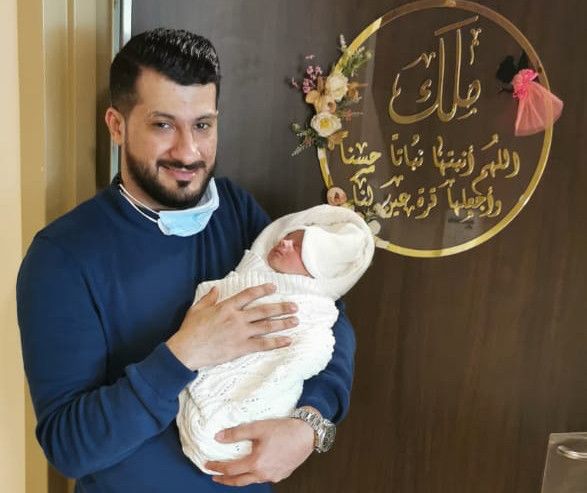Dubai: A Palestinian dad is appealing for help to raise Dh8 million to save the life of his 4-month old daughter who has a rare spinal muscular atrophy. Two years ago, the father lost his firstborn son to the same genetic disease.
It’s not only the enormous amount of money that is needed to save the life of Malak Mohammed Al Alami, whose name in English means Angel. It’s also a race against time, her father, Mohammad Al Alami, 32, told Gulf News.
According to doctors, spinal muscular atrophy (SMA) is a rare, progressive, inherited monogenic disease. It is characterised by lower motor neuron degeneration and muscle weakness. It is the second most common deadly disorder after cystic fibrosis (lung infection). In the absence of therapeutic intervention, SMA can lead to death.
That is what happened to Mohammad’s firstborn son, Abdulrahman, who was born on September 14, 2017 but passed away on November 17, 2018, after living for only one year and two months.
Abdulrahman spent seven months in the ICU. He lived most of his life on ventilator, breathing only through a tube inserted through a cut in his neck below the larynx. It was a tragedy that Mohammad and his wife, Nihal, 27, could not bear to live again.
Brave angel
Fragile as she may seem, Malak is a fighter and she has a sweet smile, made more adorable and bright with her bluish grey eyes. She has gentle personality — her parents say — and she’s also brave and has a strong will to survive.
Malak was born healthy on February 2, 2021, weighing 2.85kg at birth. Her mother was healthy and had no hypertension, diabetes or illnesses. The delivery was an elective caesarean section (CS) due to previous CS but both mother and baby were discharged from the hospital after three days.
Malak had normal newborn screening and normal hearing test. There were no concerns regarding her vision and she made regular sounds and normal cries. She had no known allergies and was not put on any medications.
“Malak was active and really healthy when she was born,” said Mohammad, adding: “She was breast and bottle-fed; she was good sucking from nipple. She gained weight. There were no concerns in the first four weeks.”
Déjà vu
But in the second month, Malak’s parents started noticing that she was no longer as active as she used to be, especially in her lower limbs. She could still move her upper limbs but they were not swaying as strong as before.
Malak’s parents brought her to a couple of paediatricians who reassured them that nothing was wrong with the baby. But they were not satisfied — they had seen this before, with their firstborn child — and unfortunately, no one ordered SMA testing for Malak despite her brother’s history.
The parents then brought Malak to Al Jalila Children’s Specialty Hospital. After conducting genetic testing, Malak was diagnosed with SMA Type I.
In a medical report signed by Dr Haitham Elbashir, consultant Paediatric Neurorehabilitation and head of Neurosciences Centre of Excellence, he noted: “Malak looks well. She’s alert. Her eyes fix and follow well in all directions. She can smile. There’s no obvious dysmorphic (abnormality) features. No facial muscles weakness and cranial nerves are essentially intact. There’s no chest deformity and she has good air entry in both lungs.”
But there is general paucity of movement with poor movement repertoire. She has head lag and truncal hypotonic (decreased muscle tone) and her arms and legs are ‘floppy’. There is also very little movement in her lower limbs (upper limbs are bit better but sluggish) and no arm extension.
What Malak’s parents feared came true. She had the same condition as her older brother, Abduraham. Malak now has little control of her neck muscles. She’s very fragile and her head tends to flop, feeling limp when held.
Hope for Malak
Dr Elbashir said Malak can be cured. He noted: “Currently, there are three treatments available for SMA, including gene therapy, which is the best treatment as it treats the root cause of the problem. Malak’s parents are keen to give her the gene therapy, given the fact that the family has lost a child before with the same disease.”

Early medical intervention is needed. The specialist doctor added: “Malak is still very young, and she will benefit greatly from the gene therapy if given immediately or soon after. SMA is a progressive disease, so it is important that children with the disease such as Malak are treated as soon as possible. Otherwise, she will deteriorate and require long-term ventilation and total dependence on adults for all her needs.”
Gene therapy
The estimated cost for Malak’s medical treatment is Dh8,045,596, with Zolgensma IV (intravenous) infusion alone costing Dh7,976,400
Zolgensma is the most expensive drug in the world. It is, however, a one-time, life-saving treatment. The drug, which is the first gene therapy for an inherited disease, was first approved by the US Food and Drug Administration in 2017. It is delivered as a single dose to address the genetic root cause of SMA. Doctors say if Malak will receive this genetic therapy, there will be no need for a chronic medication as it will produce long-term positive effects.
In the arms of an angel
As Mohammed was gently holding Malak in his arms, he and his wife have reiterated their appeal for help to save their second baby from a rare disorder. Babies with the most severe form of this disorder typically don’t live past their second birthday but Malak’s parents said they have high hopes that Malak, who will turn five months on July 2, will survive.
https://ift.tt/3dpnj2P






No comments:
Post a Comment